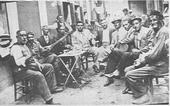Generate your own contact table!
MyGen Profile Generator Rembetika was established in parts of mainland Greece in the first two years of the 20th century. It made use of 2-3 derivatives of the turkish saz (a.k.a. tampoura and boulgari): The bouzouki and its smaller brothers, the tzouras and the baglamas. The saz itself is a lute but quite diferent from the archetypal arab lute, 'al oud' - meaning 'wood'. The latter was very popular in Asia Minor. Rembetika were urban blues of a quasi-criminal subculture, despised my the middle classes and suppressed by the authorities.In 1921 the Greek army occupied Turkey at the instigation of England, France, Italy and Russia. The Ottoman empire was in a state of collapse and the Great Powers, eager to carve up the territory, let Greece know that if they were to take the coast of Asia Minor where there were two million Greeks living there from ancient times, they could expect support. (They were using Greece to do their dirty work for them since the Italians had invaded from the south and were marching North. They wanted to use the Greeks to stop them from taking the entire coast of Asia Minor.) All went well and the Greek army controlled Smyrna and the coast but then two things happened that sent events rapidly downhill. The Greek army decided to march inland and take Ankara while at the same time the French backed out of the deal. This caused the other powers to withdraw their support so as not to start another world war. The Greek army found itself in retreat from a Turkish army led by Kemal Attaturk. As they passed through towns and cities they were joined by the local Greek population who did not want to be left behind when the angry Turks swarmed into town. Thousands died and the city of Smyrna was burned.As the army retreated back to Greece it brought with them the surviving Greek population of Asia Minor. By 1922 there were two million refugees in the country. These were Greeks who had never lived in Greece. They had come from the fertile lands of Anatolia but were now forced to live in a small mountainous country that could not support them, or in refugee settlements in Pireaus and Thessaloniki. It was in the cafes and hash dens near these settlements that what we know as Rembetika was forged from the early mainland movement with its bouzouki and the oriental tunes, rythms and singing techniques that came from Asia Minor.Imagine yourself as a refugee. In Asia Minor you may have had a business, a nice home, money, friends, family. But in the slums of Athens all you had was whatever you could carry with you out of Turkey, and your shattered dreams. You went from being in the middle class to being underground in a foreign country that did not particularly want you. Rembetika was the music of these outcasts. The lyrics reflected their surroundings, poverty, pain, drug addiction, police oppression, prison, unrequited love, betrayal and hashish. It was the Greek urban blues.With the change of the mix of followers from urban underclass to urban lower middle-class majority, the mature Rembetika music came out of the hash dens and the tekedes (Turkish style underground cafes) and into the taverns and nightclubs of Athens where it became very popular. Though some of the original Rembetika musicians had died before this period due to overdoses, tuberculosis and the general stress of the lifestyle, many became stars, recorded records, toured and generally did not have trouble finding work until the sixties when it gave way to newer forms of bouzouki-based music, superficially reminiscent of the Rembetika.Special Thanks to Matt Barrett